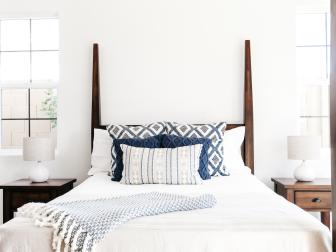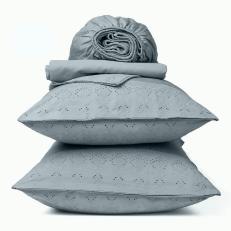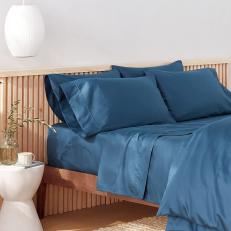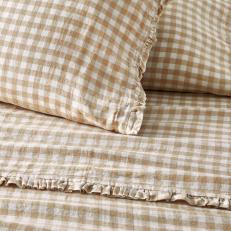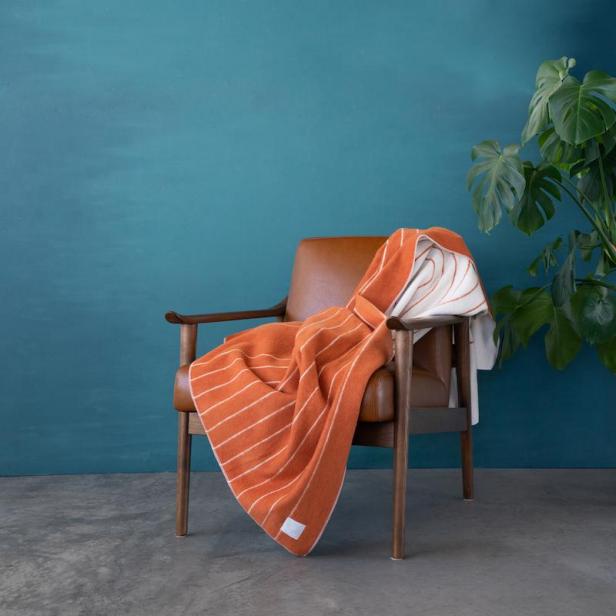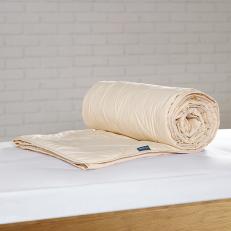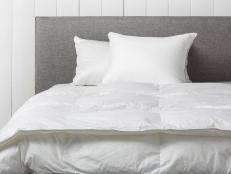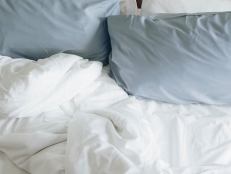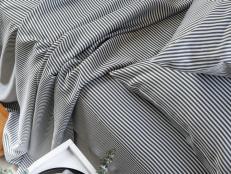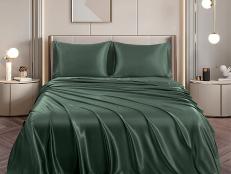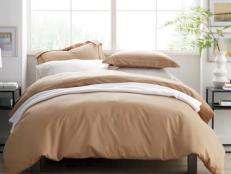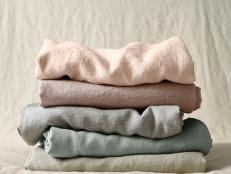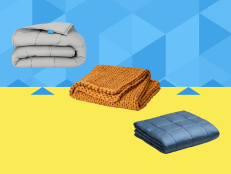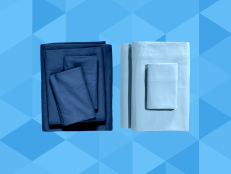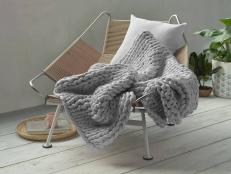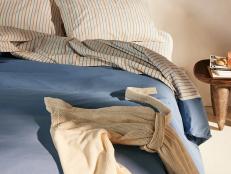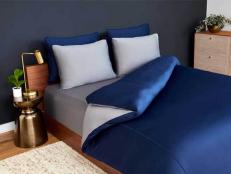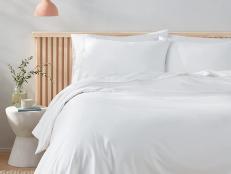How to Shop (And Not Shop) for Bedding More Sustainably
Shopping for sustainable bedding can be tricky. Here's what you should know before your next big purchase.

If you're in the market for new bedding, take a quick pause before impulse-buying that gorgeous new duvet cover you saw in a window at a nearby shopping mall. Textile production is one of the leading causes of greenhouse emissions. We usually think of clothing first when we hear about ways the textile industry hurts the planet, but the decisions we make when shopping for homegoods matter, too. And since everyone wants their products to be "sustainable" or "eco-friendly" these days, you need to do a bit more due diligence to ensure you're choosing good options.
As a consumer, it can be challenging at best to navigate making sustainable choices. There are many certification programs that try to make it easier for consumers to shop wisely, but those processes can be expensive for companies to go through, so smaller brands may find it harder to get that label even if they're doing everything right. It can be more expensive for the consumer to buy those products, too, but there are lots of ways to make better choices even if you can't splurge on the absolute best option.

For starters, look for bedding made from natural materials — such as cotton, wool, hemp, eucalyptus and linen. When you can afford to, choose options made organically. Bamboo is a bit trickier to parse through as a consumer — while it's widely touted on labels as a sustainable alternative to synthetics, the process to turn it into a soft fabric can be chemically intensive and harsh on the environment. The process for making the fabric is just as important as that of growing the material itself, says Lori Wyman, a representative for Global Organic Textile Standard (GOTS). GOTS has created a standard for ensuring that products are made organically from start to finish, and getting certified as such is a rigorous and thorough process. If a product has been certified to meet the standard (you can double-check it on the GOTS website yourself), you can trust it's a more sustainable option, Lori says.
GOTS isn't the only sustainability standard you can consider — there are others for leather, down, wool and other materials, too. You can look for certification from OEKO-TEX, the Responsible Wool Standard and the Responsible Down Standard. The latter two ensure that down and wool are produced in an ethical, humane way that respects animals.
How to Shop More Sustainably for Bedding
Pause Before You Shop
Don’t just go out and replace everything. The most sustainable bedding is the bedding you already have. Unless your sheets and blankets have worn out, buying brand-new organic cotton bedding isn’t going to help the environment. Your goal is to make more sustainable choices moving forward, not to create more waste by going full "out with the old, in with the new."
Buy Only What You Need
If what you already have works just fine but you want a new look, think about ways to refresh your design without replacing everything. Can you get a new duvet cover that goes over a comforter you already have instead of replacing the comforter? Can you find an accent blanket or vintage cushion covers or pillowcases at a thrift store instead of replacing everything or getting all new throws? Can you upcycle some plain white bedding with embroidery or patchwork?
Recycle or Upcyle What You Already Have
If you can't find a good way to repurpose what you have, think carefully about how to dispose of it all. Lots of items donated to charity shops like Goodwill end up in landfills for one reason or another — either they're not in good enough shape, or the store has too many or they just don't sell. You can be more certain your fabrics will go to a good use if you give them directly to someone who wants them, such as through Facebook Marketplace, a Buy Nothing group or a family member (maybe you have a niece, nephew or cousin starting college soon?). Or, you could find a local textile recycling program.
Buy Used
“The most sustainable thing of all is to buy used products,” Lori says. So, have a look around your local thrift shops, or check Facebook Marketplace or Craigslist if you don’t live near any. Check around with friends and neighbors, too — maybe someone has some bed linens they’ve tired of, even though they’re still in good condition. Also, check to see if your neighborhood or city participates in the Buy Nothing Project. The premise is simple: We already have so much stuff, you shouldn’t need to buy anything new when you’re in need. People use Buy Nothing to post everything from baby clothes to mattresses to clothing, furniture, home décor and more, and just like it says in the title, it’s all free.
When Shopping New, Read the Ingredients List for the Product
Being made “from 100% organic cotton” isn’t enough, Lori says — they need to be made organically, too. That’s why a standard like GOTS is helpful — products registered as GOTS-certified have been reviewed for every part of the process. Dive into the materials list on the hangtags or product website so you can see what’s in a product and how it’s referenced.
Look for Certifications
Every product that’s certified to meet GOTS standards is catalogued in the organization’s database. You can search for the company and the product on their website to make sure the GOTS claim on a product hangtag or website isn’t just a greenwashing lie.
Ask Questions
Can’t find any proof that the product you want to buy is as sustainable as you’d like it to be? Just reach out and ask. Even if you don’t get the answer you’re looking for, the simple act of asking can make a difference. Brands do hear your feedback. Showing a company that you care about its sustainability practices and you’re making shopping decisions based on the answers you hear could be the push they need to make better choices — or at least explain them more transparently — in the future.
Hang Dry Your Sheets and Blankets
Letting your sheets and duvet covers dry naturally may take longer, but you’ll see three main benefits if you do. First, your textiles — especially fitted sheets with elastic bands — will last much longer if you don’t stick them in the dryer, Lori says, which means you’ll get a lot more use out of them and won’t need to shop to replace them nearly as quickly. Second, you’ll be saving electricity by not using your dryer and avoiding the use of dryer sheets and fabric softeners. That all comes with a third benefit for you, too, which is saving money.
HGTV's Guide to Buying Sheets
Discover how to choose sheets that are soft, comfortable and long-lasting. Plus, find out the best thread count and the difference between weave types and materials.
Eco-Friendlier Materials for Bedding
Organic Cotton
There are tradeoffs for every kind of new product you can buy — every single one will have an impact, and none will be perfect. Cotton can get a bad rap for being a water-intensive plant, for example. But the pros of buying organic cotton are pretty significant, too: it's a natural material, it's produced in a way that doesn't dump harmful chemicals into the environment, and it will decompose naturally at the end of its lifecycle. These products from brands including Coyuchi, Boll & Branch and Linenscape are all certified to meet either GOTS or OEKO-TEX standards.
Amazon Just Launched a New Organic Line With Sustainable Homewares for Every Room
For 100-percent organic cotton, the prices are surprisingly low.
Hemp
Hemp is a hardier, less water-intensive plant than cotton. While it doesn't have the same reputation for softness or luxury as cotton has long enjoyed, it's growing in popularity as a textile and products are getting better. Well-cared-for hemp products can last a lifetime, Lori says.
Linen
Linen is made from flax, a hardy plant that can be woven entirely into a fabric — which means there's less waste in the production process. It can biodegrade very quickly at the end of its life cyle, sometimes in a matter of just a couple of weeks, so your linen clothes, sheets and blankets won't leave toxic waste behind.
Eucalyptus (TENCEL)
You may occasionally see products labeled as "eucalyptus," which might seem a bit odd — eucalyptus trees aren't exactly soft, cozy fibers. But eucalyptus is one of the raw materials that goes into TENCEL, a brand that produces modal and lyocell fabrics from sustainably sourced plants. Brands like Buffy use TENCEL in their eucalyptus sheet set and in the face fabric for their duvets. Bearaby uses TENCEL in the brand's cooling weighted blanket, the Tree Napper.
Responsible Wool
Like the fabrics listed above, wool is a natural material that will decompose when you're ready to dispose of it but will last a long time if cared for well. Ethical wool has a lot of benefits: As an insulating material, it can pack a lot of heat, and when woven into a blanket, it can be quite soft and cozy. If you're shopping for next-to-skin wool blankets, consider going merino. Merino wool fibers are shorter and finer than standard wool, which means it's softer against your skin and won't be scratchy.






